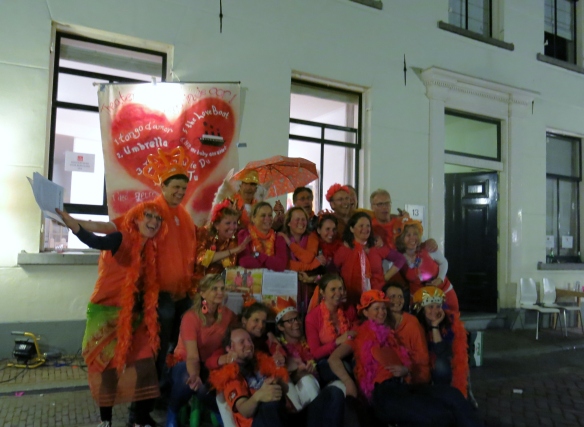
Revelers on the evening before King’s Day, at the Utrecht vrijmarkt, Friday, April 25.
If this were a sci-fi tale, it would begin with an extraterrestrial creature painting the Netherlands in a day-glow orange with magical properties that turns people inside-out, changes their personalities, and causes riots in the streets. Well, for two days this past weekend the Dutch were awash in orange, the national color, but the orange hues were self-applied, often in interesting styles. And while no one rioted in the streets (this year), the normally sensible, quiet Dutch were replaced by ecstatically happy, noisily-partying Dutch of all ages and stripes. The squares and parks were filled with musical entertainment for all ages, the streets and bars packed with party-goers, and orange-themed party boats sailed the canals, music and horns blaring.

Cute girl and father with matching hats. (Typical guy — still has the sales tag on it!)
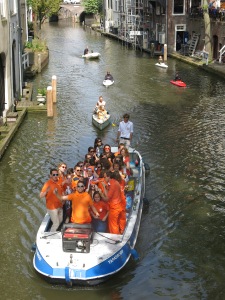
I stopped to take a photo and in turn was toasted by these mid-day party-boaters. What fun!
The occasion? Koningsdag, or King’s Day, the first ever. Hence the riotous parties and wild orange attire. Since 1890, the Netherlands’ titular ruler has been a female member of the House of Orange-Nassau, the Dutch royal family. (The Dutch recognize the oldest child – not the oldest son – as the heir to the throne.) Back in the 1880’s, Princess Day was created to celebrate the birthday of the then heir apparent, Princess Wilhelmina. When Wilhelmina assumed the throne, the celebration logically became Queen’s Day. Since then, the country has usually celebrated the monarch’s birthday as Queen’s Day. (The exception was Queen Beatrix, Willem’s mother, who kept her mother’s April 30 birthdate as Queen’s Day as her own birthday was at the end of January – not exactly a great time to be having an outdoor party.)
More importantly, Queen’s Day (now King’s Day) has become the biggest national celebration in the Netherlands over the years. Sure, there are hard-core royalists who actually are honoring the monarch, but for the majority of Dutch, it’s just an opportunity to let loose and have one huge party all over the country. Flags were flown, public entertainment abounded, and the beer flowed, some of it orange…
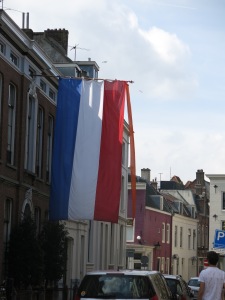
The Dutch flag with an orange pennant at the top. The orange pennant, signifying the House of Orange-Nassau, the Dutch Royal Family, is attached on King’s Day and on royal birthdays.
And why is this King’s Day so important? Last April 30, Queen Beatrix abdicated in favor of her son, Willem-Alexander, and there was neither a Queen’s or King’s Day, but a coronation. So, King’s Day 2014 was the highly anticipated blow-out of a party all over the country.
King’s Day in Utrecht
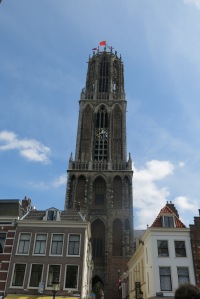
Even the Dom Toren was decked out in orange.
The major cities of the Netherlands are known for their unique spin on this annual celebration. Den Haag is known for its many musical venues at night, Utrecht for having the largest open air flea market, and Amsterdam, well, of course Amsterdam just has the biggest block party in the entire country.
Utrecht’s King’s Day celebrations begin at 6 p.m. the night before with the opening of the Vrijmarkt, literally “free market,” or flea market. Dutch throughout the country spread out blankets and set up stalls or card tables, to display for sale whatever trinkets, clothing, records, appliances or unwanted birthday gifts that have been collecting dust over the years. However, Utrecht simply has the biggest vrijmarkt in the country. Streets throughout the old part of the city were packed with gewgaws and people poring over them for something they just had to have.
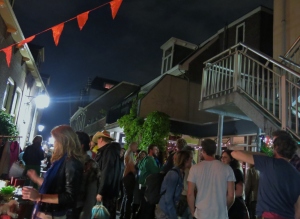
Because we didn’t get started walking through the vrijmarkt until after 10 Friday night, the streets were packed with bargain hunters and revelers were in full swing. Nonetheless, there were still many bargains to be had, often for € 1 or less, and the entire city was in party mode.
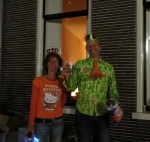
What was remarkable was how neat the partiers were that first night….
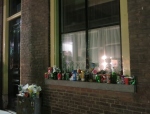
Only the Dutch would neatly line up their trash. (It didn’t last.)
Saturday, April 26, was the main celebration of King’s Day. Michael and I donned our orange – sunglasses for him, an orange scarf & tee for me – and started out fairly early, shortly after noon, in search of the festivities. We walked a circular route through the binnestad (inner city) of old Utrecht, which is bisected by two canals, the Oudegracht (Old Canal) and Nieuwegracht (New Canal – which is over 500 years old!).
This being Holland, canals abound – everywhere – providing the perfect opportunity to get your friends together and take to the water for your party. Some boats brought their own DJ, other boats brought their own band. It’s a good thing these boats are fairly flat-bottomed: everyone was singing, dancing and tooting horns or whirling noise-makers.
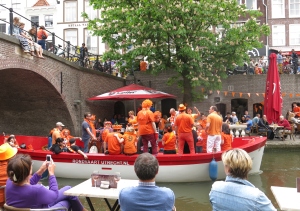
Check out the various costumes and accessories on this party boat. Note the people sitting on the bridge above — best seats in the house.
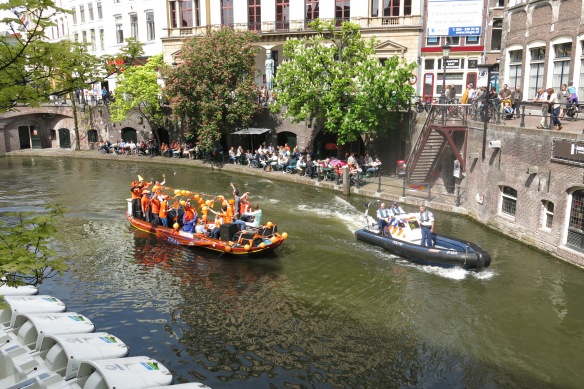
Happy party boat on the Oudegracht (Old Canal). Note the police patrol boat to the right and how amused they are!
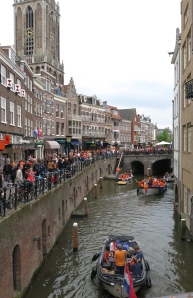
Party boats at a narrow section of the Oudegracht. The old Fish Market was held over the bridge; the small square is an outdoor cafe now.
We stopped at several locales to quaff our thirst and take in the merriment. Part of the fun was checking out the various costumes. Unfortunately, I too often wasn’t quick enough or at the right angle to get a pic of some of the more entertaining, like a guy dressed in an orange “ermine” cloak and a huge crown on his head.
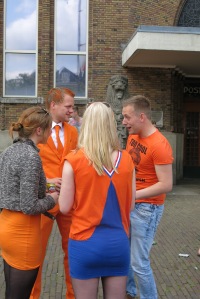
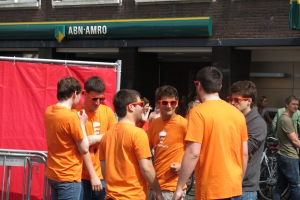
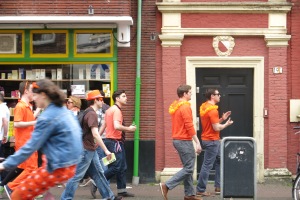
Check out those checkered pants on the cyclist whizzing by.
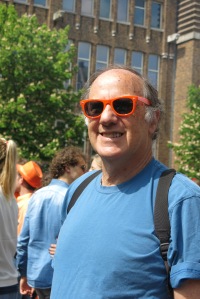
Check out that handsome dude with the orange zonnebrils (sunglasses).
And walking through several streets converted to flea markets:
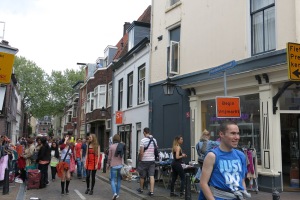
Hardbollen Street – the Ladies in Windows are no more. (The city relocated the prostitutes of Hardbollen St. to another party of Utrecht.)
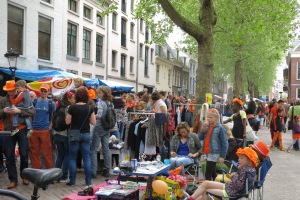
Breedstraat, around the corner from where we lived the first year, is normally a quiet interlude — not during King’s Day!
And of course, checking out the entertainment, from DJs on café sidewalks and in the smaller squares to bands galore.
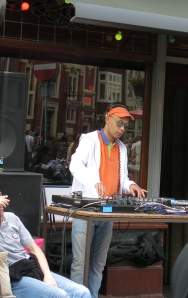
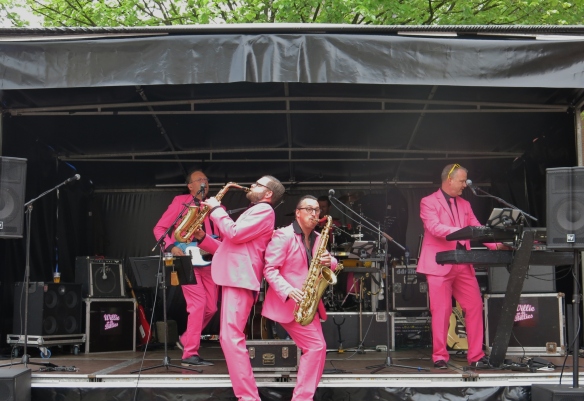
Willie and the Billies
Our absolute favorite that day was a rockin’ band of guys in pink called Willie and the Billies. Their rousing, bouncy music was a combination of big band, jazz and polka along with on-stage antics. They were hysterically funny doing their schtick.
Ironically, Willie et al. were playing in a little courtyard across from the apartment we had the first year in Utrecht. If we were still in that apartment, we could have sat on our balcony and enjoyed the band from there!
By about 4 in the afternoon, the inner city was packed. Some spots on our agenda we had to give up on because literally you could not push your way through the crowds. Sardines in a cannery have more wiggle room. Beer cans (almost exclusively Heineken – it’s like the Dutch version of Budweiser) and wine bottles rolled underfoot on all the streets – all attempts at tidiness had disappeared.
We threaded our way through the crowds to a popular corner on the Oudegracht with four or five watering holes, didn’t see any of our friends (they’d given up too, it turned out) so we finally headed back home for a rest. Eventually we wandered back out for dinner and another short walk along the canals to round out our first King’s Day. And what an experience it was!
King’s Day Trivia:
- April 26, 2014 was the first King’s Day EVER in the Netherlands. There has been no male monarch since 1890.
- Utrecht had a major role in the origins of the celebration of the reigning monarch’s birthday. A Utrecht newspaper editor proposed a “Princess’s Day” in honor of the Crown Princess Wilhelmina upon her 5th birthday in 1885. When she became Queen in 1890, the holiday became Queen’s Day.
- King Willem-Alexander’s actual birthday is April 27. However, the Dutch do not celebrate Queen’s or King’s Day on a Sunday, which is why the official holiday was the day before — a Saturday.
- King Willem-Alexander was born here in Utrecht, at the Utrecht University Medical Center (where Michael teaches). He was born April 27, 1967.
- He was the first Dutch male royal baby born since 1851.
- King Willem-Alexander is the youngest monarch in Europe.
- In his youth, the king was called “Prince Pils” because of his partying life at university. He’s been trying to repackage and restore his image ever since. (Oh those rollickin’ Royals! Who’d have ever thunk it?)
Happy King’s Day!
![]()

Carol Barbier Rolnick grew up in Japan and Southeast Asia, traveling extensively as a child through Asia, the Mideast and Europe on family vacations. Travel has continued as a priority through raising kids and continuing into retirement, extending adventures through the Americas, southern Africa, Asia, and repeat trips throughout Europe. Carol and her husband, Michael spent four summers based in Utrecht, The Netherlands, which has become like a second home. They are (still) aiming towards Australia-New Zealand and Antarctica to round off their continental travels.








